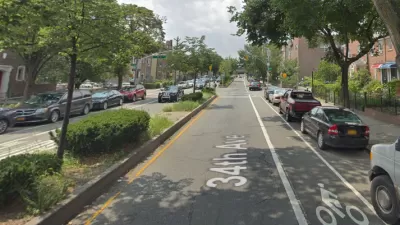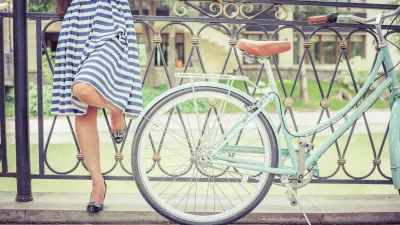The growth of pedestrianized spaces and car-free streets depends on a transformational shift in thinking about what—and who—public spaces and streets are for.

The fierce debate over how to use public space continues as cities weigh the future of the ‘open streets’ initiatives that gained popularity during the pandemic. Reis Thebault outlines the ongoing issue in The Washington Post.
Over the last year alone, major U.S. cities doubled-down on plans to restrict driving on main streets. Municipalities from Michigan to Washington, D.C., banned right turns at red lights. Voters earmarked billions for public transit projects. Officials unveiled hundreds of miles of new bike lanes. New York City proposed a new tax on motorists, and California relaxed jaywalking restrictions and freed up land once reserved for parking spaces.
These nationwide actions signal a shift in how we view public space, which has for decades been largely devoted to accommodating cars and driving. Change hasn’t come without controversy, but car-free streets are gaining widespread public support and momentum.
The article points to the heated fight over car access to San Francisco’s JFK Promenade (nee JFK Drive), a 1.5-mile stretch of road in Golden Gate Park. Last November, “More than 60 percent of voters approved a measure permanently banning cars from part of JFK Drive, while a similar number rejected a competing initiative that would have allowed cars to return to stretches of Golden Gate Park and the Great Highway, another popular city roadway that was partially closed at the onset of the pandemic.”
FULL STORY: Inside the movement to remake America’s city streets

Planetizen Federal Action Tracker
A weekly monitor of how Trump’s orders and actions are impacting planners and planning in America.

Maui's Vacation Rental Debate Turns Ugly
Verbal attacks, misinformation campaigns and fistfights plague a high-stakes debate to convert thousands of vacation rentals into long-term housing.

San Francisco Suspends Traffic Calming Amidst Record Deaths
Citing “a challenging fiscal landscape,” the city will cease the program on the heels of 42 traffic deaths, including 24 pedestrians.

Amtrak Rolls Out New Orleans to Alabama “Mardi Gras” Train
The new service will operate morning and evening departures between Mobile and New Orleans.

The Subversive Car-Free Guide to Trump's Great American Road Trip
Car-free ways to access Chicagoland’s best tourist attractions.

San Antonio and Austin are Fusing Into one Massive Megaregion
The region spanning the two central Texas cities is growing fast, posing challenges for local infrastructure and water supplies.
Urban Design for Planners 1: Software Tools
This six-course series explores essential urban design concepts using open source software and equips planners with the tools they need to participate fully in the urban design process.
Planning for Universal Design
Learn the tools for implementing Universal Design in planning regulations.
Heyer Gruel & Associates PA
JM Goldson LLC
Custer County Colorado
City of Camden Redevelopment Agency
City of Astoria
Transportation Research & Education Center (TREC) at Portland State University
Jefferson Parish Government
Camden Redevelopment Agency
City of Claremont





























